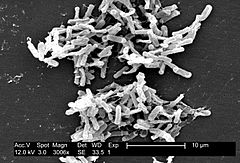Clostridium facts for kids
Quick facts for kids Clostridium |
|
|---|---|
 |
|
| SEM micrograph of Clostridium difficile colonies from a stool sample. | |
| Scientific classification | |
| Domain: | |
| Phylum: | |
| Class: | |
| Order: | |
| Family: |
Clostridiaceae
|
| Genus: |
Clostridium
Prazmowski 1880
|
Clostridium is a type of bacteria. These tiny living things are shaped like rods. The name "Clostridium" comes from an old Greek word, kloster, which means "spindle."
Clostridium bacteria are special because they are obligate anaerobes. This means they do not need oxygen to grow or live. They are also gram-positive and can make tough, protective endospores. These spores help them survive in harsh conditions.
Contents
What are important Clostridium species?
There are many different kinds, or species, of Clostridium bacteria. Some of these species can cause serious illnesses in people.
Clostridium botulinum
Clostridium botulinum bacteria make a strong toxin called botulinum. This toxin can cause a dangerous illness called botulism.
Botulism can make your muscles weak or even paralyze them. If the muscles you use for breathing become paralyzed, it can be very serious.
Most cases of botulism happen when people eat food that was not cooked or canned correctly. For example, homemade canned foods need to be prepared very carefully.
Babies under one year old should not eat natural honey. This is because honey can have Clostridium botulinum spores. Babies do not have enough "good" bacteria in their intestines to fight off these spores. Older children and adults usually have enough healthy bacteria to eat honey safely.
Sometimes, doctors use tiny amounts of botulinum toxin as medicine. For example, a medicine called Botox contains this toxin. It can be injected into the forehead to relax muscles and make wrinkles look smoother.
Clostridium difficile
Clostridium difficile (often called C. diff) can cause bad diarrhea and serious sickness. People often get C. diff infections after taking antibiotic medicines.
Antibiotics kill the good bacteria in your intestines that normally keep C. diff under control. This allows C. diff to grow too much.
C. diff infection can spread easily from person to person. It is becoming more common in hospitals and nursing homes. In the United States, about 14,000 people die each year from C. diff infection.
Clostridium difficile is also an antibiotic-resistant bacteria. This means that many common antibiotics cannot kill it. This makes C. diff infections hard to treat.
Clostridium tetani
Clostridium tetani bacteria cause an illness called tetanus. People usually get tetanus when these bacteria get into a cut or wound.
At first, tetanus causes the muscles in the jaw to spasm or tighten. This is why tetanus is sometimes called "lockjaw." It can make it hard to swallow. As the illness gets worse, other muscles in the body can become stiff and spasm too.
Getting a tetanus immunization (a shot) can protect people from getting tetanus.
See also
 In Spanish: Clostridium para niños
In Spanish: Clostridium para niños
 | Delilah Pierce |
 | Gordon Parks |
 | Augusta Savage |
 | Charles Ethan Porter |

